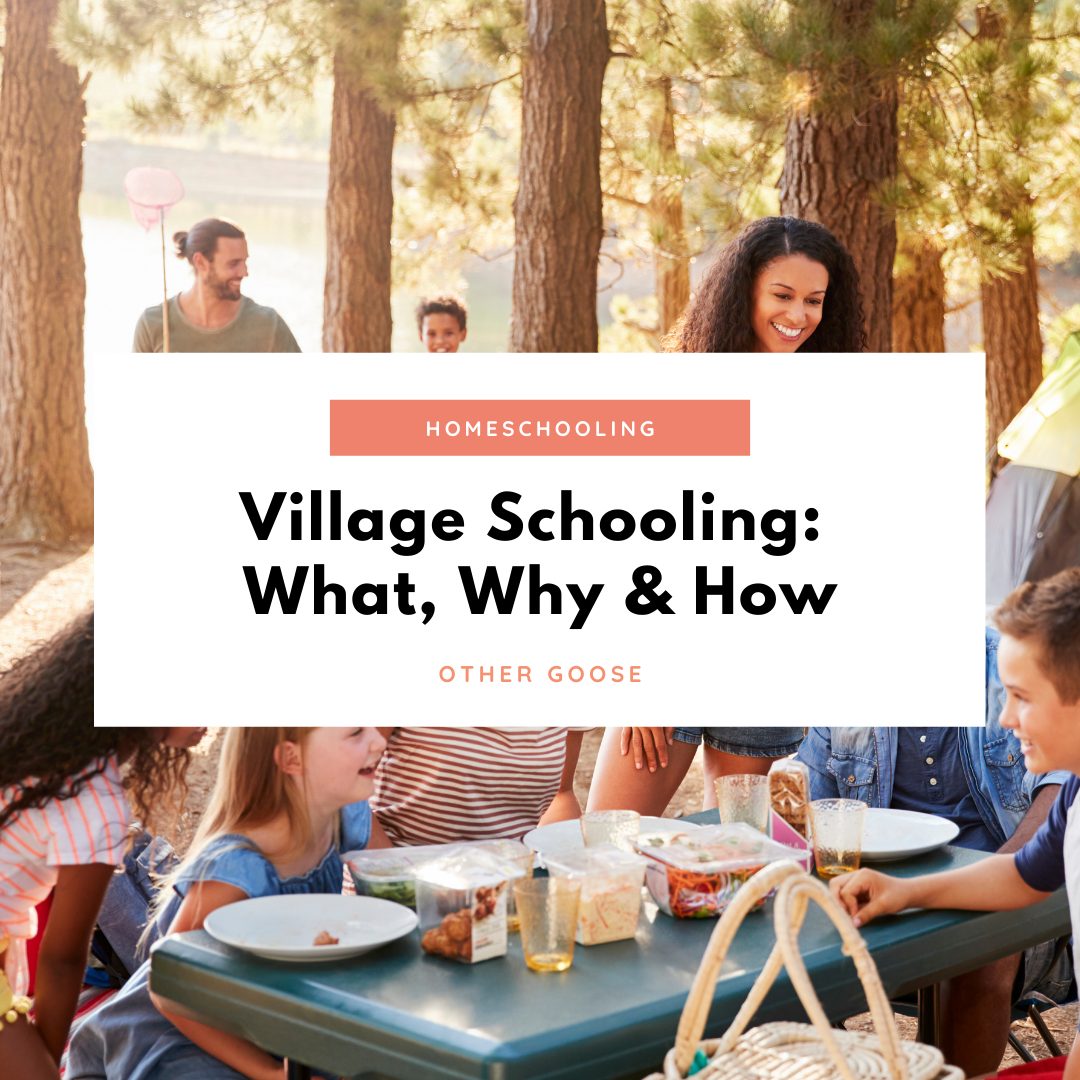
Ready to hear one of the greatest tools you have at your disposal as a parent and teacher? It’s not the curriculum. It’s not the method. It’s not the stack of flashcards, the Wobbel board, or the 101 Play Hacks e-book your favorite Instagram account keeps touting.
It’s far simpler, and far more powerful: your village.
Hear us loud and clear: one of the most impactful teachers you can offer your children might just be a mile or two away.
Have an uncle who fishes? An aunt who bakes? A best friend who speaks Spanish? A neighbor who drums? Invite them over to show your child a thing or two.
(Really. It’s that simple.)
Around here, we call it village schooling. Read below to get the rundown – including where to start, how it works, and why it’s the most sustainable way to educate a child in today’s fast-paced, modern society.
An Education With Context
We’re quick to assume that teaching our kids means to follow a certain set of standards, both real and imagined. Our culture is conditioned to think that the sharing of knowledge is best left to those with degrees, the accredited experts, folks with letters next to their name and a diploma behind glass. Or perhaps worse, we’ve bought into the myth that it’s up to us alone – that if we should dare to choose an alternative way to educate our kids, the weighty responsibility falls on our own two shoulders.
But we’ve been given something better. We’ve been given the gift of teaching alongside relationship, of education within context. An aunt who can pass along her lemon bar recipe with a memory attached, who sifts the flour while telling tales of hard-fought beauty from the depression era. A best friend who rolls his Rs, who shows your child a photo album of Guadalajara, of what his home means to him, of how Saturday mornings in the fútbol yard were the greatest adventures of his lifetime.
There isn’t a curriculum more rich, nor a living book more alive.
Where to Start
Consider your child’s education as a unique, robust experience you can curate in your own backyard. For a moment, forget the methodologies, standards, and expert advice on everything every child should know. Start, instead, with your values. What do you want your child to know? What knowledge can you, yourself, pass along? How about your family? Your friends? Your community? How, specifically, can you rally your village in these early years?
In my own home, we’ve done this with a NUMBER of skills: I’ve outsourced my own kids’ drumming lessons, Chinese immersion, fishing know-how, beginning sewing – all to the people I love and interact with on a regular basis. And I’ve taught other people’s kids how to swim, or read, or even how to blow a massive bubble gum bubble. The truth is: we all have some incredible resources within arm’s reach, and often times, we don’t even realize it! What’s ordinary to us is extraordinary to someone else.
Why it works
Not only is village schooling a sustainable way to outsource parts of your child’s education, but unsurprisingly, the benefits far outweigh simple time management.
Remember when you were a new parent and you went crazy nesting for your first baby? The laundered onesies, the tiny shoes, the patterned crib sheets. You nested and nested and nested, preparing yourself and your home as much as you could from the shock of a newborn.
Guess what? Nesting doesn’t end with babies. With any luck, we’ll be nesting for the rest of our lives – welcoming fresh insights and borrowed perspectives from people who have walked all manners of roads. We’ll be softening the blow of our kids’ future hardship with gentle words from friends who have lived experiences different from our own. We’ll be collecting mentors – an advantage far more powerful than the musical baby mobile we splurged on many, many years ago.
By activating the power of village schooling, you’ll be intentionally building a greater community for your child – and yourself. A safe haven ripe with shared values and mutual respect. A nest, if you will.
Your Turn
Think about a few of your kids’ interests and reach out to some close friends or family that might excel in those areas. Ask if they’d be open to mentoring your child in that skill – or at least showing them a trick or two – and see what happens next. Consider a skill swap with another parent and share your own knowledge, too – calligraphy, carpentry, anything goes! Village schooling is a great way to gauge whether or not your child might enjoy more formal lessons in the future.
Need a bit of inspiration in the meantime? Enjoy our list of 8 read-alouds to celebrate every child’s village, no matter how far:
- The Relatives Came, by Cynthia Rylant
- Mrs. Katz and Tush, by Patricia Polacco
- Miss Tizzy, by Libba Moore Gray
- Mr. George Baker, by Amy Hest
- When Lightning Comes in a Jar, by Ernest L. Polacco
- The Gardener, by Sarah Stewart
- The Keeping Quilt, by Patricia Polacco
- Peter’s Old House, by Elsa Beskow
p.s. Speaking of rallying that village, did you know Other Goose offers readymade mentors and a built-in community for each of our members? Take a look here!
